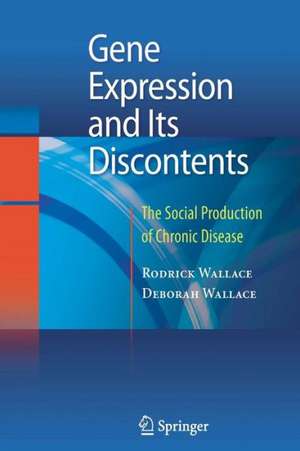Gene Expression and Its Discontents: The Social Production of Chronic Disease
Autor Rodrick Wallace, Deborah Wallaceen Limba Engleză Paperback – 29 noi 2014
| Toate formatele și edițiile | Preț | Express |
|---|---|---|
| Paperback (2) | 782.27 lei 6-8 săpt. | |
| Springer International Publishing – 29 apr 2018 | 782.27 lei 6-8 săpt. | |
| Springer – 29 noi 2014 | 1526.50 lei 6-8 săpt. | |
| Hardback (1) | 1104.84 lei 6-8 săpt. | |
| Springer International Publishing – 21 dec 2016 | 1104.84 lei 6-8 săpt. |
Preț: 1526.50 lei
Preț vechi: 1606.85 lei
-5% Nou
Puncte Express: 2290
Preț estimativ în valută:
292.08€ • 304.99$ • 241.20£
292.08€ • 304.99$ • 241.20£
Carte tipărită la comandă
Livrare economică 15-29 aprilie
Preluare comenzi: 021 569.72.76
Specificații
ISBN-13: 9781489985316
ISBN-10: 148998531X
Pagini: 240
Ilustrații: IX, 227 p.
Dimensiuni: 155 x 235 x 13 mm
Greutate: 0.34 kg
Ediția:2010
Editura: Springer
Colecția Springer
Locul publicării:New York, NY, United States
ISBN-10: 148998531X
Pagini: 240
Ilustrații: IX, 227 p.
Dimensiuni: 155 x 235 x 13 mm
Greutate: 0.34 kg
Ediția:2010
Editura: Springer
Colecția Springer
Locul publicării:New York, NY, United States
Public țintă
Professional/practitionerCuprins
Models of development.- Groupoid symmetries.- Epigenetic catalysis.- Developmental disorders.- An interim perspective.- The obesity pandemic in the US.- Coronary heart disease in the US.- Cancer: a developmental perspective.- Autoimmune disorders.- Demoralization and obesity in Upper Manhattan.- Death at an early age: AIDS and related mortality in New York City.- Final thoughts.- Mathematical appendix.- References.
Textul de pe ultima copertă
A cognitive paradigm for gene expression, via the asymptotic limit theorems of information theory, allows better understanding of how embedding context affects the development of organisms. In sum, epigenetic information sources act as tunable catalysts, directing ontogeny into characteristic pathways, a perspective having important implications for epigenetic epidemiology. The authors show how environmental stressors, in a large sense, can induce a broad spectrum of developmental dysfunctions, and examine a number of pandemic chronic diseases, using U.S. data at different scales on the effects of the legacy of slavery compounded by accelerating industrial and urban decay. Developmental disorders, broadly taken, are unlikely to respond to medical interventions in the face of serious, persistent individual and community stress. In particular, drugs powerful enough to affect deleterious epigenetic programming will likely trigger side effects leading to shortened lifespan. The address of pandemic chronic disease requires significant large-scale changes in public policy and resource allocation.
Caracteristici
Includes supplementary material: sn.pub/extras
Notă biografică
Rodrick Wallace PhD is a research scientist at the New York State Psychiatric Institute, received his B.S. in mathematics and a Ph.D. in physics from Columbia University.. A recipient of an Investigator Award in Health Policy Research from The Robert Wood Johnson Foundation. He has published many papers adapting quantitative methods from population, community and ecosystem ecology to the theoretical and empirical analysis of problems of public health and public order. Recently he has attempted to adapt methods from information theory to the study of evolutionary process in medical sociology, biology and economics.
